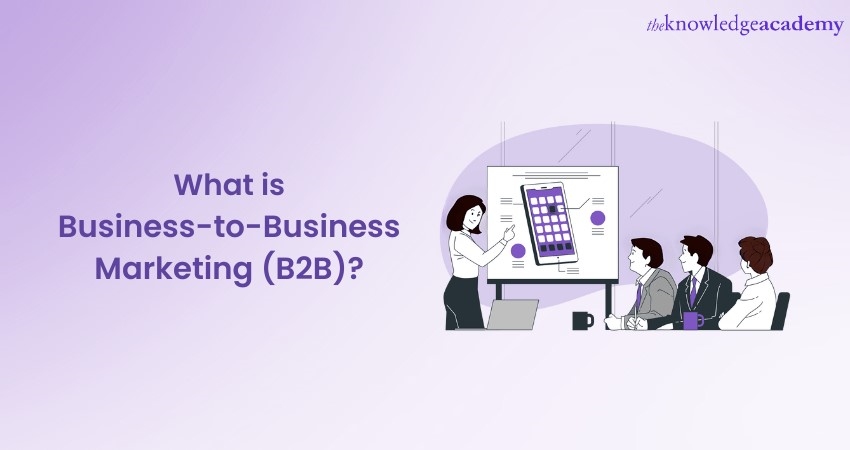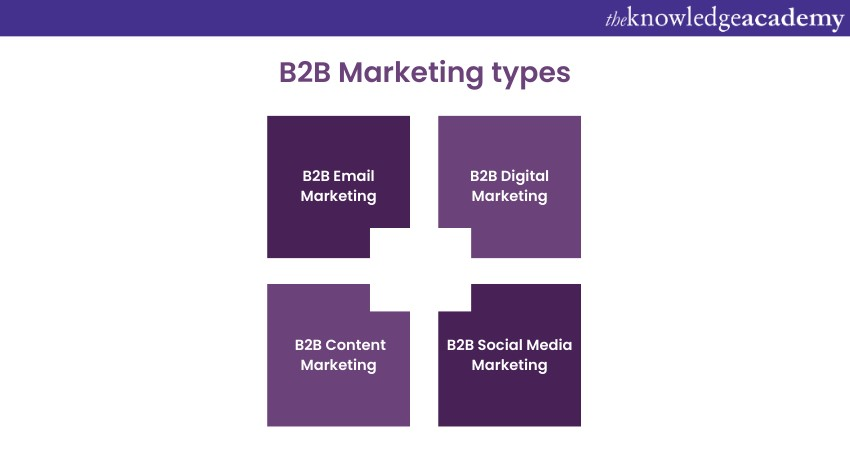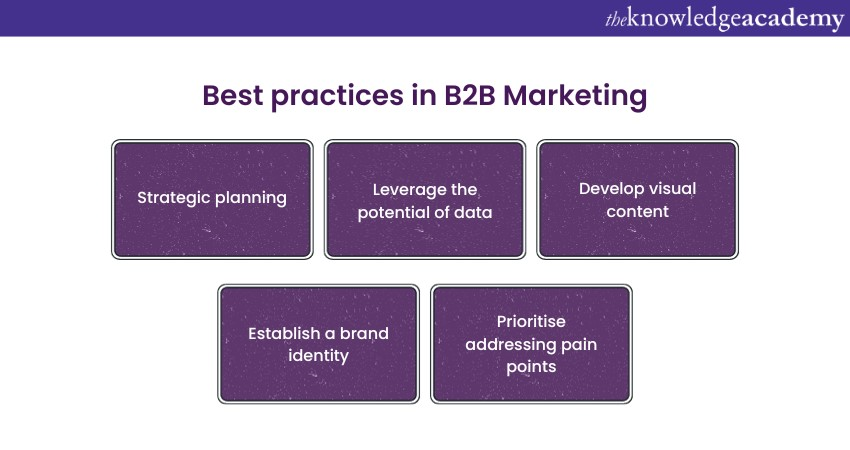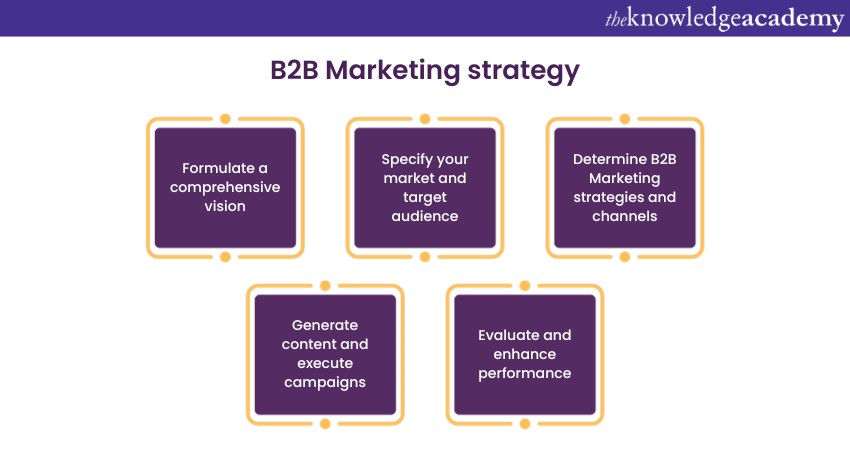We may not have the course you’re looking for. If you enquire or give us a call on 01344 203999 and speak to our training experts, we may still be able to help with your training requirements.
Training Outcomes Within Your Budget!
We ensure quality, budget-alignment, and timely delivery by our expert instructors.

Have you ever wondered how Businesses connect, communicate, and thrive in today's market? Through this blog, learn about the various B2B Marketing types, strategies for success, and best practices that propel Businesses forward. Whether you're a seasoned marketer or new in this field, this blog unlocks the secrets of effective Business-to-Business Marketing, emphasising the importance of strategic connections in the ever-evolving Business landscape. Explore the ins and outs of Business-to-Business Marketing, and let's unravel its power together!
Eager to learn about marketing and its benefits, refer to our blog on "What is Marketing"
Table of Contents
1) What is Business to Business Marketing?
2) B2B Marketing types
3) B2B Marketing strategy
4) Best practices in B2B Marketing
5) Conclusion
What is Business-to-Business Marketing?
One domain stands out in the vast Marketing landscape for its unique dynamics and complexities - Business-to-Business Marketing (B2B). At its core, B2B Marketing involves the exchange of services, goods or information between Businesses rather than targeting individual consumers. Understanding the nuances of this intricate field is crucial for Businesses aiming to thrive in today's interconnected market.
Business-to-Business Marketing is a strategic approach where Businesses sell their services or products. Unlike Business-to-Consumer (B2C) Marketing, where the end consumer is the target, B2B Marketing revolves around catering to the needs of another Business entity.
B2B Marketing types
In the expansive field of Business-to-Business (B2B) Marketing, various strategic approaches are employed to address the unique challenges and opportunities presented in the Business realm. This exploration delves into four fundamental B2B Marketing types, each playing a distinctive role in fostering connections and driving Business success.

B2B Email Marketing
At the core of B2B Email Marketing lies the utilisation of emails as a means of communication and relationship-building between Businesses. This approach transcends mere promotional content, focusing on developing enduring connections. It emphasises personalised communication through targeted email campaigns, seeking to provide value through informative and relevant content. B2B Email Marketing is vital for nurturing leads, sustaining client relationships, and facilitating efficient communication within the complex B2B landscape.
B2B Digital Marketing
B2B Digital Marketing is a comprehensive strategy that harnesses the power of online channels to enhance a Business's digital presence and connectivity. This type encompasses a range of tactics, including search engine optimisation (SEO), pay-per-click (PPC) advertising, and social media Marketing. The overarching goal is to increase online visibility, generate quality leads, and foster engagement. B2B Digital Marketing adapts to the dynamic digital landscape, offering Businesses a platform to connect with potential clients globally and stay agile despite evolving technological trends.
B2B Content Marketing
Central to effective B2B Marketing is B2B Content Marketing, a strategy built around creating and disseminating valuable, relevant, consistent content. Unlike traditional promotional approaches, B2B Content Marketing seeks to attract and engage a specific target audience by providing insights and solutions. It involves crafting various forms of content, such as whitepapers, case studies, blog posts, and webinars. The aim is to position the Business as an industry authority, offering expertise that resonates with the informational needs of Businesses. B2B Content Marketing aligns with the stages of the buyer's journey, addressing awareness, consideration, and decision-making.
B2B Social Media Marketing
B2B Social Media Marketing has emerged as a significant player in the contemporary landscape. This strategy leverages LinkedIn, Twitter, and Facebook platforms to foster connections and share industry insights. Unlike B2C-oriented social media, B2B Social Media Marketing is not solely about building a follower base; it serves as a space for Businesses to showcase expertise, engage in industry conversations, and stay informed about trends. With its professional focus, LinkedIn has become a hub for B2B networking, while Twitter enables quick updates and engagement. Even Facebook, traditionally more B2C-centric, offers opportunities for B2B brands to build a community and share visually engaging content.
Elevate your marketing prowess with our Consumer Behaviour Masterclass – navigate the intricacies of customer choices and enhance your business strategy today!
B2B Marketing strategy
In the intricate landscape of Business-to-Business (B2B) Marketing, success hinges on a well-defined and comprehensive strategy. A robust B2B Marketing strategy involves a series of strategic steps, each crucial for navigating the complex terrain of Business relationships and transactions. Let's delve into the elements that constitute an effective B2B Marketing strategy:

Formulate a comprehensive vision
B2B Marketing strategy lies a comprehensive vision that serves as a guiding force for all Marketing initiatives. This vision is not just about increasing sales; it's about establishing a lasting presence and fostering meaningful connections within the industry. Formulating a comprehensive vision requires a deep understanding of the Business's mission, values, and long-term goals.
A well-crafted vision acts as a roadmap, providing direction for Marketing efforts. It ensures that every aspect of the strategy aligns with the Business's overarching goals, whether it be expanding market share, entering new territories, or solidifying the brand's position as an industry leader. This step is the foundation upon which the entire B2B Marketing strategy is built, providing clarity and purpose.
Specify your market and target audience
In the dynamic world of B2B Marketing, knowing your market and understanding your audience is paramount. Identifying the specific industries, sectors, or regions where your products or services hold the most value is the foundation of effective targeting. It involves conducting thorough market research to uncover the target market's opportunities, challenges, and trends.
Once the market is defined, the next critical step is honing in on the target audience. Creating detailed buyer personas that encapsulate the ideal customers' characteristics, needs, and pain points ensures that your Marketing efforts resonate with the right stakeholders and decision-makers. Specificity in market and audience identification allows for a tailored approach that increases the relevance and impact of your Marketing messages.
Determine B2B Marketing strategies and channels
With a clear vision and a defined target, the next step is determining the most effective B2B Marketing strategies and channels. It involves carefully evaluating the available options, considering factors such as the nature of the products or services, the preferences of the target audience, and the competitive landscape.
B2B Marketing strategies may include a mix of traditional and digital approaches. Trade shows, industry events, and direct outreach can complement digital strategies like content Marketing, email campaigns, and social media engagement. The key is to create a blend that maximises reach and engagement across various touchpoints. Determining the right strategies and channels requires understanding where your target audience is most receptive and how they prefer to consume information.
Generate content and execute campaigns
Content is the foundation of any B2B Marketing strategy. Once the vision is set, the market is identified, and the strategies are determined, the next step is to generate compelling and relevant content. In the B2B realm, content goes beyond product descriptions; it includes whitepapers, case studies, and educational materials that showcase your Business's expertise.
Executing campaigns involves more than disseminating content; it's about orchestrating a cohesive and integrated effort across chosen channels. Whether through email, social media, or other avenues, campaigns should align with the overarching strategy, delivering a consistent message reinforcing the Business's value proposition. The content should be tailored to address the informational needs of the target audience at different stages of the buyer's journey.
Evaluate and enhance performance
A successful B2B Marketing strategy doesn't end with the execution of campaigns; it requires continuous evaluation and enhancement. Monitoring key performance indicators (KPIs) is essential to gauge the strategy's effectiveness. Metrics such as conversion rates, lead generation and customer acquisition costs provide valuable insights into the performance of various initiatives.
Regularly assessing performance allows Businesses to identify what's working and needs adjustment. This iterative process is crucial for staying agile in the face of market changes and evolving customer preferences. It also ensures the B2B Marketing strategy remains aligned with the Business's objectives.
Supercharge your business acumen with our Introduction to Marketing Training – empower your journey to marketing mastery today!
Best practices in B2B Marketing
Effective strategies are essential for success in the dynamic realm of Business-to-Business (B2B) Marketing. B2B Marketing is a nuanced field that demands a thoughtful approach to connect with other Businesses and create lasting relationships. This exploration delves into five key best practices that can serve as a guide for Businesses seeking success in the B2B landscape:

Strategic planning
At the core of effective B2B Marketing lies strategic planning. This practice involves setting goals, defining objectives, and outlining the steps needed to achieve them. Strategic planning is an ongoing process of adapting to the evolving market dynamics.
Businesses engaging in B2B Marketing must articulate a clear vision and mission. It involves understanding the Business's long-term objectives, unique value proposition, and how it differentiates itself in the market. Strategic planning should encompass short-term and long-term goals, ensuring every Marketing initiative aligns with the broader Business strategy.
A B2B Marketing strategy requires identifying KPIs to measure success.Regularly reviewing and adjusting the strategy based on performance data is integral to strategic planning. This iterative approach allows Businesses to stay agile and responsive to changes in the market.
Leverage the potential of data
In the data-driven era, harnessing the power of data is a crucial best practice in B2B Marketing. It involves collecting, analysing, and interpreting data to gain insights into customer behaviour, market trends, and the performance of Marketing initiatives. Leveraging the potential of data enables Businesses to make informed decisions and optimise their strategies for maximum impact.
Data can be obtained from various sources, including customer interactions, website analytics, and market research. Analysing this data provides valuable insights into customer preferences, purchasing behaviour, and areas for improvement. Businesses can use data to segment their target audience, personalise Marketing messages, and tailor their approach to specific market segments.
The use of data extends beyond campaign optimisation; it also plays a important role in lead generation and customer retention. By understanding their audience's pain points and preferences, Businesses can create targeted and relevant content that resonates with clients. This data-driven approach ensures that B2B Marketing efforts are strategic, highly targeted, and effective.
Develop visual content
Visual content has become a important tool in B2B Marketing. Developing visual content goes beyond the traditional text-based approach, incorporating images, infographics, videos, and other visually appealing elements into Marketing materials. Visual content has the potential to capture attention, convey complex information succinctly, and leave a lasting impression on the audience.
In the B2B context, where the audience is often comprised of busy professionals, visual content communicates information quickly and effectively. Infographics, for example, can distil complex data into easily digestible visuals, making it easier for decision-makers to understand key insights. Conversely, videos provide a dynamic and engaging way to showcase products, explain concepts, and share success stories.
The visual content development should align with the overall brand identity and messaging. Consistency in visual elements across Marketing materials helps improve brand recognition and establish a cohesive brand image. Visual elements play a important role in enhancing the impact and memorability of B2B Marketing messages, whether in presentations, social media posts, or website content.
Establish a brand identity
Establishing a brand identity in the crowded B2B landscape is a best practice that sets Businesses apart from their competitors. The brand identity encompasses the visual elements, messaging, and values that define how a Business presents itself to the world. It goes beyond logos and colour schemes; it represents the personality and values that resonate with the audience.
A brand identity creates a sense of trust and credibility in the B2B market. When Businesses consistently present themselves with a distinct and cohesive brand image, it fosters recognition and familiarity among their audience. It is particularly crucial in B2B relationships, where trust is a cornerstone of successful partnerships.
Establishing a brand identity involves defining the Business's unique value proposition, mission, and vision. It requires a understanding of the target audience and how the brand aligns with their needs and preferences. Consistency in branding across all touchpoints, from websites and social media to Marketing materials and communications, reinforces the brand identity and builds a strong foundation for B2B success.
Prioritise addressing pain points
Understanding and addressing the target audience's pain points is a fundamental best practice in B2B Marketing. Prioritising and addressing pain points involves identifying potential clients' challenges, concerns, and issues in their Business operations. B2B Marketing messages should resonate with these pain points, offering solutions and positioning the Business as a valuable partner in overcoming challenges.
It requires a understanding of the target audience and their needs. Conducting market research, engaging in customer feedback, and actively listening to the audience's concerns are essential to identifying pain points. Once identified, Businesses can tailor their Marketing messages to highlight how their products or services provide solutions and alleviate the challenges faced by their clients.
Addressing pain points is not limited to Marketing messaging; it should be integrated into the customer journey. From the awareness stage to the decision-making phase, Marketing materials, content, and interactions should consistently demonstrate how the Business understands and can effectively address the pain points of its audience.
Elevate your marketing prowess with Marketing Courses —ignite your success today!
Conclusion
In the world of Business, success relies on smart strategies. Business-to-Business Marketing (B2B) is the key to building lasting connections. Businesses can thrive by planning carefully, using data wisely, creating eye-catching content, establishing a strong brand identity, and focusing on solving problems. B2B Marketing is the roadmap to success, guiding Businesses through the complex landscape of partnerships and growth.
Transform your business with effective marketing strategies – Sign up for our Business Marketing Strategies Training now!
Frequently Asked Questions
Upcoming Digital Marketing Resources Batches & Dates
Date
 Business Marketing Strategies Training
Business Marketing Strategies Training
Fri 21st Feb 2025
Fri 25th Apr 2025
Fri 20th Jun 2025
Fri 22nd Aug 2025
Fri 17th Oct 2025
Fri 19th Dec 2025







 Top Rated Course
Top Rated Course



 If you wish to make any changes to your course, please
If you wish to make any changes to your course, please


